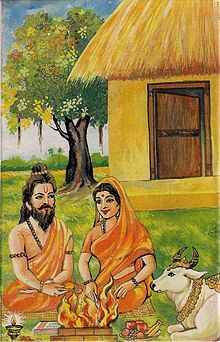“The argument may be given that since in the Vedas there are prescribed and forbidden activities, the Vedas also accept the concept of good and evil within the material world. The fact is, however, that it is not the Vedas themselves but the conditioned souls who are bound up in material duality. The function of Vedic literature is to engage each individual at the particular level on which he is presently situated and gradually elevate him to the perfection of life. The material mode of goodness is not itself spiritual, but it does not impede spiritual life. Since the material mode of goodness purifies one’s consciousness and creates a hankering for higher knowledge, it is a favorable platform from which to pursue spiritual life, just as the airport is a favorable place from which to travel. If a man desires to travel from New York to London, the New York airport is certainly the most favorable place from which to travel. But if the man misses his plane, he is no closer to London than anyone in New York who did not go to the airport. In other words, the advantage of the airport is meaningful only if one catches his plane. Similarly, the material mode of goodness is the most favorable situation from which to move up to the spiritual platform. The Vedas prescribe and forbid various activities to lift the conditioned soul to the material mode of goodness, and from that point he should rise to the spiritual platform by transcendental knowledge. Therefore if one does not come to the platform of Kṛṣṇa consciousness, his elevation to the material mode of goodness is useless, just as a trip to the airport is useless for one who misses his plane. In the Vedas there are injunctions and prohibitions that appear to accept good and evil among material things, but the ultimate purpose of the Vedic regulations is to create a favorable situation for spiritual life. If one can immediately take to spiritual life then there is no need to waste time with rituals within the modes of nature. Therefore Kṛṣṇa advises Arjuna in Bhagavad-gītā (2.45):
trai-guṇya-visayā vedā nistrai-guṇyo bhavārjuna
nirdvandvo nitya-sattva-stho niryoga-kṣema ātmavān
“The Vedas mainly deal with the subject of the three modes of material nature. Rise above these modes, O Arjuna. Be transcendental to all of them. Be free from all dualities and from all anxieties for gain and safety, and be established in the Self.” In this connection, Śrīla Madhvācārya has quoted the following verses from Mahābhārata:
svargādyāś ca guṇāḥ sarve doṣāḥ sarve tathaiva ca
ātmanaḥ kartṛtā-bhrāntyā jāyante nātra saṁśayaḥ
“Within the material world, the conditioned souls consider residence on the heavenly planets and celestial pleasures, such as the pious enjoyment of beautiful women, to be good and desirable things. Similarly, painful or miserable conditions are considered to be evil or bad. However, all such perception of good and bad in the material world is undoubtedly based upon the fundamental mistake of considering oneself, and not the Supreme Personality of Godhead, to be the ultimate doer or performer of all actions.”
paramātmānam evaikaṁ kartāraṁ vetti yaḥ pumān
sa mucyate ’smāt saṁsārāt paramātmānam eti ca
“On the other hand, a person who knows that the Supreme Personality of Godhead is the actual controller of material nature, and that it is ultimately He who is moving everything, can free himself from the bondage of material existence. Such a person goes to the abode of the Lord.”
Source: A.C. Bhaktivedanta Swami Prabhupada (2014 edition), “Srimad Bhagavatam”, Eleventh Canto, Chapter 07 – Text 08.





















Leave A Comment